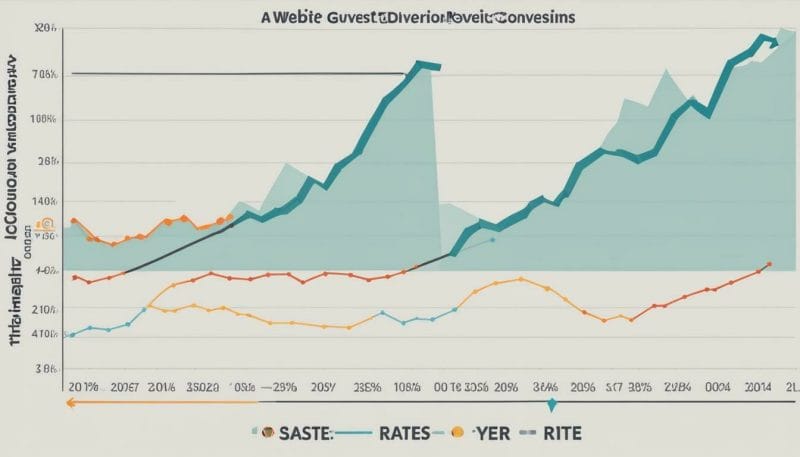Wondering “does Google Ads allow affiliate links?” Look no further, as we at Loudachris Digital Marketing have the answers you need.
When it comes to affiliate marketing on Google Ads, there are guidelines and policies that need to be followed. While Google Ads does allow affiliate marketing, there are specific terms and conditions that advertisers and affiliate networks must adhere to.
One important consideration is not using paid traffic on brand names and keywords. However, there are various strategies you can employ to promote affiliate links through Google Ads. For example, driving paid traffic to a landing page or blog post that includes affiliate links can be an effective method.
Choosing the right affiliate program is crucial to finding success on Google Ads. It’s important to select trustworthy and reliable programs that align with your target audience. Additionally, adhering to Google Ads policies is essential to avoid any penalties or account suspensions.
Tracking conversions is another key aspect of measuring the success of your affiliate marketing campaigns on Google Ads. Utilising conversion tracking tools will enable you to optimise your strategies and ensure maximum return on investment.
If Google Ads does not allow affiliate links, there are alternative advertising options to explore. Consider native advertising, targeted ads on social media platforms, display advertising, and email marketing as viable alternatives.
For our Australian readers, it’s essential to understand the specific guidelines and regulations surrounding affiliate marketing in Australia. We will provide insights into the legal and ethical considerations to help you navigate this industry successfully.
Key Takeaways:
- Google Ads does allow affiliate marketing but has specific guidelines to follow.
- Affiliate links can be promoted through strategies like driving paid traffic to landing pages or blog posts.
- Choosing the right affiliate program is crucial for success on Google Ads.
- Conversion tracking is essential for measuring campaign success and optimising strategies.
- If Google Ads doesn’t allow affiliate links, explore alternatives like native advertising and targeted ads on social media.
- Australian readers should be aware of the guidelines and regulations surrounding affiliate marketing in Australia.
Google Ads Policy on Affiliate Links
Understanding the policies and guidelines regarding affiliate links on Google Ads is essential for any advertiser. While Google Ads allows affiliate marketing, there are certain policies and restrictions in place to maintain the integrity and quality of the platform.
Firstly, advertisers should be aware that Google Ads does not allow the use of paid traffic on brand names and keywords. This means that advertisers cannot directly bid on and promote affiliate links using brand names or specific keywords related to the brand. However, there are still opportunities to promote affiliate links through Google Ads.
One effective strategy is to drive paid traffic to a landing page or blog post that includes relevant content and affiliate links. By providing valuable information or resources, advertisers can attract users and promote affiliate products or services indirectly.
Google Ads guidelines also emphasize the importance of choosing the right affiliate program. Advertisers should thoroughly research and select trustworthy and reliable affiliate programs that align with their target audience and marketing goals. By partnering with reputable affiliate networks, advertisers can ensure that their affiliate links comply with Google Ads policies and provide a positive user experience.

| Policy | Description |
|---|---|
| No paid traffic on brand names and keywords | Advertisers cannot directly bid on and promote affiliate links using brand names or specific keywords related to the brand |
| Drive traffic to landing pages or blog posts | Advertisers can promote affiliate links indirectly by driving paid traffic to informative and relevant landing pages or blog posts |
| Choose trustworthy affiliate programs | Advertisers should select reputable affiliate programs that align with their target audience and marketing goals, ensuring compliance with Google Ads policies |
In summary, Google Ads does allow affiliate marketing, but with certain guidelines and restrictions. By understanding these policies and following best practices, advertisers can effectively promote affiliate links on the platform and measure campaign success through conversion tracking. However, if Google Ads is not suitable for affiliate marketing, there are alternative options such as native advertising, targeted social media ads, display advertising, and email marketing.
Promoting Affiliate Links on Google Ads
There are various effective ways to promote affiliate links on Google Ads and maximise your earnings. Google Ads allows advertisers to use affiliate links, but it’s important to follow their guidelines and policies to ensure compliance and avoid any penalties. Here are some strategies to consider:
- Drive Paid Traffic to Landing Pages: Create targeted ads that lead to landing pages containing your affiliate links. Optimise your ad copy and keywords to attract relevant traffic and increase the chances of conversions.
- Create Compelling Blog Posts: Write informative blog posts that incorporate your affiliate links naturally. Share valuable content that addresses your audience’s pain points and includes product recommendations with your affiliate links.
- Utilize Remarketing Campaigns: Set up remarketing campaigns to target users who have previously shown interest in your affiliate products. This approach keeps your brand top-of-mind and encourages potential customers to make a purchase using your affiliate links.
- Leverage Display Advertising: Use Google’s display network to showcase visually appealing banner ads featuring your affiliate offers. Display ads can capture attention and generate clicks, driving traffic to your landing pages or blog posts.
Remember to always choose affiliate programs that align with your niche and offer reputable products or services. Conduct thorough research to ensure the program’s terms and conditions suit your advertising goals. Additionally, closely monitor your campaign performance by tracking conversions and adjusting your strategies accordingly.

By utilising these strategies and following Google Ads’ policies and guidelines, you can effectively promote affiliate links and increase your chances of success. However, if Google Ads does not allow affiliate links, there are alternative advertising options to explore, such as native advertising, targeted ads on social media platforms, display advertising, and email marketing. These alternative options can help you reach your target audience and drive conversions outside of the Google Ads platform while maximising your affiliate marketing efforts.
Choosing the Right Affiliate Program
Selecting the right affiliate program is crucial to ensure a successful campaign on Google Ads. When considering affiliate programs, it is important to evaluate their reputation, reliability, and compatibility with your target audience. Here are some key factors to consider when choosing the right affiliate program:
- Relevance: Look for affiliate programs that align with your niche or industry. Promoting products or services that are relevant to your audience will increase the chances of conversions and success.
- Commission Structure: Review the commission rates offered by different affiliate programs. Some programs may provide higher commissions, while others may offer recurring commissions. It is essential to choose a program that offers fair and competitive rates.
- Support and Resources: Consider the level of support and resources provided by the affiliate program. Look for programs that offer marketing materials, tracking tools, and dedicated support to help you optimise your campaigns.
- Terms and Conditions: Carefully read and understand the terms and conditions of the affiliate program. Pay attention to any restrictions or guidelines that may affect your advertising strategies on Google Ads. Some programs may have limitations on using paid traffic or bidding on brand names and keywords.

Remember to thoroughly research and compare different affiliate programs before making a decision. Taking the time to choose the right program will significantly impact the success of your affiliate marketing campaigns on Google Ads.
| Affiliate Program | Commission Rate | Support and Resources | Relevance |
|---|---|---|---|
| Program A | 10% | Marketing materials, tracking tools, dedicated support | Highly relevant to your niche |
| Program B | 15% | Basic marketing materials, limited support | Somewhat relevant to your niche |
| Program C | 8% | No marketing materials, minimal support | Not very relevant to your niche |
By carefully considering these factors and conducting thorough research, you can choose the right affiliate program to maximise your success on Google Ads.
Following Google Ads Policies
To maintain a compliant and successful presence on Google Ads, it is crucial to follow their affiliate marketing policies. Google Ads has specific guidelines and restrictions when it comes to using affiliate links in your campaigns. Advertisers and affiliate networks must adhere to these policies to ensure a positive user experience and avoid any penalties or account suspensions.
One of the key restrictions is the prohibition of using paid traffic on brand names and keywords. This means that you cannot use Google Ads to bid on brand terms or use them in your ad copy if you are promoting affiliate links. It is essential to review the terms and conditions of your chosen affiliate program to ensure compliance with these policies.
To promote affiliate links on Google Ads, you can consider driving paid traffic to a dedicated landing page or blog post that includes your affiliate links. This approach allows you to provide valuable content to users while still monetizing through affiliate marketing.
Conversion tracking is also crucial for measuring the success of your affiliate marketing campaigns on Google Ads. By using conversion tracking tools, you can monitor the performance of your campaigns in terms of clicks, conversions, and revenue generated. This data will help you optimise your strategies and make informed decisions to drive better results.

| Restriction | Explanation |
|---|---|
| No Paid Traffic on Brand Names | Affiliate marketers cannot use paid ads to bid on brand terms or include them in ad copy. |
| Compliance with Affiliate Program Terms | Advertisers and affiliate networks must adhere to the terms and conditions of their chosen affiliate program. |
If Google Ads does not allow the use of affiliate links, there are alternative advertising options available. Native advertising, targeted ads on social media platforms, display advertising, and email marketing are just a few examples. These alternatives can help you reach your target audience and promote your affiliate offers effectively.
Remember, it is important to choose the right affiliate program and ensure compliance with Google Ads policies to create a successful and profitable affiliate marketing campaign.
Tracking Conversions and Measuring Success
Tracking conversions and measuring the success of your affiliate marketing campaigns on Google Ads is essential for optimising your strategies. It allows you to identify which campaigns and keywords are driving the most conversions, helping you allocate your budget effectively and maximise your return on investment.
To track conversions, you can use the conversion tracking feature provided by Google Ads. This feature allows you to set up conversion actions, such as purchases or sign-ups, and track them across your campaigns. By placing a conversion tracking code on your website, you can monitor the actions taken by users who clicked on your affiliate links.
Once you have set up conversion tracking, you can access valuable insights into the performance of your campaigns. Google Ads provides data on the number of conversions, the conversion rate, and the cost per conversion. This information helps you understand which campaigns are driving the most valuable actions and make data-driven decisions to optimise your affiliate marketing efforts.
| Key Metrics | Definition |
|---|---|
| Conversions | The number of desired actions completed by users who clicked on your affiliate links. |
| Conversion Rate | The percentage of clicks that result in a conversion. |
| Cost per Conversion | The average amount you spent on advertising for each conversion. |
“Tracking conversions and measuring the success of your affiliate marketing campaigns on Google Ads is like having a compass that guides you toward profitable opportunities. It allows you to focus on the areas that generate the most revenue and optimise your strategies accordingly.”
With this data, you can identify underperforming campaigns and make adjustments to improve their performance. For example, if a particular keyword is driving a low conversion rate, you can refine your targeting or adjust your ad copy to better resonate with your audience. By continuously monitoring and optimising your campaigns, you can achieve better results and drive more conversions.

Remember, conversion tracking is not only about measuring success but also about identifying areas for improvement. By analyzing the data provided by Google Ads and making informed decisions based on those insights, you can refine your affiliate marketing strategies and achieve better results on the platform.
Key Takeaways:
- Tracking conversions is crucial for optimising your affiliate marketing campaigns on Google Ads.
- Use Google Ads’ conversion tracking feature to set up and monitor your desired actions.
- Key metrics to focus on include conversions, conversion rate, and cost per conversion.
- Analyze the data provided by Google Ads to identify underperforming campaigns and make data-driven optimisations.
Alternative Advertising Options
If Google Ads does not allow the use of affiliate links, there are alternative advertising options that can still generate successful results. As an affiliate marketer, it’s important to explore different avenues to reach your target audience and drive conversions. Here are some alternative options to consider:
Native Advertising
Native advertising involves creating content that blends seamlessly with the platform it is displayed on. This type of advertising can be highly effective in capturing the attention of users and driving engagement. By creating native ads that align with the interests and preferences of your target audience, you can promote your affiliate links in a subtle and non-intrusive way.

Display Advertising
Display advertising involves placing visually appealing ads on websites, apps, or social media platforms. You can reach a broad audience by carefully selecting websites or platforms that align with your niche and target demographic. Display ads can include images, videos, or interactive elements to engage users and drive them to click on your affiliate links.
Email Marketing
Email marketing remains a powerful tool for affiliate marketers. By building a targeted email list, you can send personalised messages and promotions directly to your subscribers. Craft compelling emails that highlight the benefits of the products or services you are promoting and include your affiliate links. Remember to comply with email marketing regulations and ensure that recipients have given their consent to receive emails from you.
In conclusion, if Google Ads does not allow the use of affiliate links, it’s essential to explore alternative advertising options. Native advertising, display advertising, and email marketing are just some of the effective strategies you can implement to reach your audience and drive conversions. Consider the strengths of each option and align them with your affiliate marketing goals for optimal results.
Affiliate Marketing Guidelines in Australia
To ensure compliance with affiliate marketing guidelines in Australia, it is important to understand the legal and ethical considerations. As an affiliate marketer, you need to be aware of the regulations set forth by the Australian Competition and Consumer Commission (ACCC) and the Australian Communications and Media Authority (ACMA).
One key aspect to keep in mind is transparency. It is essential to clearly disclose your affiliate relationships and any financial incentives you may receive for promoting certain products or services. This can be done through prominent and easily understandable disclaimers on your website or in your promotional materials.
Additionally, the ACCC expects affiliate marketers to provide accurate and honest information about the products or services they are promoting. You should avoid making misleading claims or exaggerating the benefits of a product. Being transparent and providing genuine recommendations will help you establish trust with your audience and maintain a positive reputation.
Furthermore, it is crucial to respect consumer privacy and comply with data protection laws in Australia. Make sure you have appropriate consent from individuals before collecting or using their personal information. Safeguarding customer data and respecting their privacy rights is not only a legal requirement but also an ethical responsibility.

| Summary of Key Considerations: | Guidelines and Regulations |
|---|---|
| Transparency | Disclose affiliate relationships and incentives in a clear and prominent manner |
| Honesty | Avoid misleading claims and provide accurate information about products or services |
| Privacy | Respect consumer privacy rights and comply with data protection laws |
To summarize, affiliate marketing in Australia requires adherence to legal and ethical guidelines. By being transparent, honest, and respectful of consumer privacy, you can build a successful and trustworthy affiliate marketing business that complies with Australian regulations. If you have any further queries or need assistance in navigating the affiliate marketing landscape, don’t hesitate to reach out to us at Loudachris Digital Marketing. We are here to help you thrive in your affiliate marketing endeavors in Australia.
Conclusion
In conclusion, Google Ads does allow the use of affiliate links, but it is crucial to follow their policies and guidelines to ensure success. Advertisers and affiliate networks may have specific terms and conditions, such as restrictions on using paid traffic for brand names and keywords. However, there are various effective strategies to promote affiliate links through Google Ads. For example, driving paid traffic to a landing page or blog post that includes affiliate links can help generate conversions and revenue.
Choosing the right affiliate program is also essential. It is important to find trustworthy and reliable programs that align with your target audience and offer competitive commission rates. By partnering with reputable affiliate programs, you can enhance the credibility and trustworthiness of your campaigns.
Following Google Ads policies is critical to maintain a positive and compliant advertising experience. By adhering to their guidelines, you can avoid penalties or account suspensions. It is important to stay updated with any policy changes and regularly review your campaigns to ensure they comply with the latest guidelines.
Tracking conversions and measuring campaign success is key to optimising your affiliate marketing efforts on Google Ads. By implementing conversion tracking tools, you can gather valuable data on user behavior and campaign performance. This data can help you refine your strategies, identify areas of improvement, and maximise your return on investment.
If Google Ads does not allow the use of affiliate links, there are alternative advertising options available. Native advertising, targeted ads on social media platforms, display advertising, and email marketing are effective alternatives that can help you reach and engage your target audience.
If you need further guidance or assistance with affiliate marketing in Australia, Loudachris Digital Marketing is here to help. Our team of experts can provide clarity on affiliate marketing practices, help you choose the right affiliate program, and optimise your campaigns for success. Contact us today to elevate your affiliate marketing efforts and achieve your business goals.
Can Loudachris Digital Marketing Assist with Using Affiliate Links in Google Ads?
Loudachris Digital Marketing can help with using affiliate links in Google Ads without using competitors’ names in ads. Their expert team understands the rules and regulations surrounding affiliate marketing and can ensure compliance while still driving traffic and conversions for your campaigns.
FAQ
Does Google Ads allow affiliate links?
Yes, Google Ads does allow affiliate marketing. However, there are some guidelines and restrictions to follow.
What is Google Ads’ policy on affiliate links?
Google Ads has specific policies in place regarding the use of affiliate links. Advertisers and affiliate networks may have their own terms and conditions, such as restrictions on using paid traffic on brand names and keywords.
How can I promote affiliate links on Google Ads?
There are various ways to promote affiliate links on Google Ads. You can drive paid traffic to a landing page or blog post that includes affiliate links.
How do I choose the right affiliate program for Google Ads?
It is important to choose a reliable and trustworthy affiliate program when using Google Ads. Consider factors such as the program’s reputation, payout structure, and alignment with your target audience.
What are the guidelines for following Google Ads policies?
To comply with Google Ads policies, it is essential to read and understand the guidelines. Adhering to these regulations will help you avoid penalties or account suspensions.
How can I track conversions and measure the success of my affiliate marketing campaigns on Google Ads?
Implementing conversion tracking tools is crucial for measuring the success of affiliate marketing campaigns on Google Ads. These tools will help you monitor performance and optimise strategies for better results.
Are there alternative options if Google Ads does not allow affiliate links?
Yes, if Google Ads does not allow affiliate links, there are alternative advertising options available. These include native advertising, targeted ads on social media platforms, display advertising, and email marketing.
What are the affiliate marketing guidelines in Australia?
Affiliate marketing in Australia has specific guidelines and regulations. It is essential to understand the legal and ethical considerations of affiliate marketing in the country.
Book your FREE Google Ads Audit Today.

Chris Lourenco is the director of Loudachris Digital Marketing, an Adelaide-based SEO, Google Ads, and web design agency. Chris excels in crafting bespoke, results-driven strategies that help businesses get more traffic, leads and sales.



